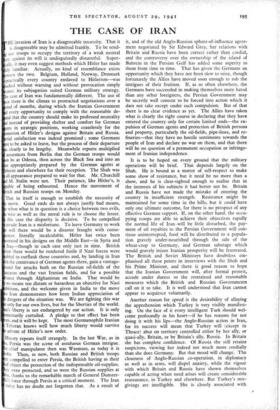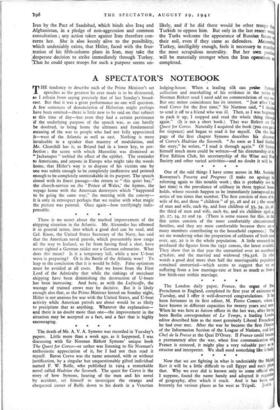THE CASE OF IRAN
HE invasion of Iran is a disagreeable necessity. That it is disagreeable may be admitted frankly. To be send- our troops to occupy the territory of a weak neutral ate against its . will is undisguisedly distasteful. Super- ially, it may even suggest methods which Hitler has made -ly familiar. Actually, no kind of resemblance exists tween the two. Belgium, Holland, Norway, Denmark practically every country enslaved to Hitlerism—was cked without warning and without provocation simply cause its subjugation suited German military strategy. e case of Iran was fundamentally different. The use of ce there is the climax to protracted negotiations over a riod of months, during which the Iranian Government d every opportunity to comply with the reasonable de- and that the country should make its professed neutrality instead of providing shelter and comfort for German nts in strategic positions, working ceaselessly for the omotion of Hitler's designs against Britain and Russia.
trial satisfaction was indeed promised ; some Germans e to be asked to leave, but the process of their departure s clearly to be lengthy. Meanwhile reports multiplied
assurances from Berlin that the German troops would
n be at Odessa, then across the Black Sea and into an appropriately prepared by the German agents at
eran and elsewhere for their reception. The Shah was all appearance prepared to wait for that. Mr. Churchill d M. Stalin were not. Their patience, like Hitler's, is able of being exhausted. Hence the movement of itish and Russian troops on Monday.
That in itself is enough to establish the necessity of
e move. Good ends do not always justify bad means, t when what is in question is a choice between two evils, e wise as well as the moral rule is to choose the lesser. this case the disparity is decisive. To be compelled invade Iran is a misfortune. To leave Germany to work will there would be a disaster fraught with conse- ences literally incalculable. Hitler has twice been tilted in his designs on the Middle East—in Syria and Iraq—though in each case only just in time. British on there would be rendered futile if Nazi forces were abled to outflank those countries and, by landing in Iran th the connivance of German agents there, gain a vantage- ound for attacks both on the Russian oil-fields of the ucasus and the vast Iranian fields, and for a possible vance through Afghanistan on India. That would be no means too distant or hazardous an objective for Nazi bitions, and the welcome given in India to the move o Iran demonstrates how keen Indian appreciation of e dangers of the situation was. We are fighting this war only for our own lives, but for the liberties of the world. n's liberty is not endangered by our action. It is only omentarily curtailed. A pledge to that effect has been en, and it will be kept. The most Germanophile Iranian Teheran knows well how much liberty would survive advent of Hitler's new order.
History repeats itself strangely. In the last War, as in s, Persia was the scene of-assiduous German intrigue. e chief manipulator then was Wasmtiss, as today it is oba. Then, as now, both Russian and British troops re compelled to enter Persia, the British having as their lef object the protection of the indispensable oil-supplies. ey were protected, and so were the Russian supplies at Ku, thanks to the remarkable march of General Dunster- k's force through Persia at a critical moment. The Iran today has no doubt not forgotten that. As a result of it, and of the old Anglo-Russian sphere-of-influence agree- ment negotiated by Sir Edward Grey, her relations with Britain and Russia have been correct rather than cordial, and the controversy over the ownership of the island of Bahrein in the Persian Gulf has added some asperity to them from time to time. That has given the Germans an opportunity which they have not been slow to seize, though fortunately the Allies have moved soon enough to rob the intrigues of their fruition. If, as so often elsewhere, the Germans have succeeded in making themselves more hated than any other foreigners, the Persian Government may be secretly well content to be forced into action which it dare not take except under such compulsion. But of that there is no clear evidence as yet. The Allies have taken what is clearly the right course in declaring that they have entered the country only for certain limited ends—the ex- pulsion of German agents and protection of British persons and property, particularly the oil-fields, pipe-lines, and re- fineries—that they have no hostile sentiments towards the people of Iran and declare no war on them, and that there will be no question of a permanent occupation or infringe- ment of Iranian independence.
It is to be hoped on every ground that the military operations will be brief. That depends largely on the Shah. He is bound as a matter of self-respect to make some show of resistance, but it need be no more than a show, and he is clear-sighted enough to realise that in the interests of his subjects it had better not be. Britain and Russia have not made the mistake of entering the country in insufficient strength. Resistance might be maintained for some time in the hills, but it could have only one ultimate outcome, for there is no prospect of any effective German support. If, on the other hand, the occu- pying troops are able to achieve their objectives rapidly the normal life of Iran .will be little disturbed, the pay- ment of oil royalties to the Persian Government will con- tinue uninterrupted, food will be distributed to a popula- tion gravely under-nourished through the sale of the wheat-crop to Germany, and German sabotage which would gravely injure Iranian prosperity will be frustrated. The British and Soviet Ministers have doubtless em- phasised all these points in interviews with the Shah and his Prime Minister, and there is good reason to hope that the Iranian Government will, after formal protest, accede under duress to the restrained and reasonable measures which the British and Russian Governments call on it to take. It is well understood that Iran cannot appear to acquiesce voluntarily.
Another reason for speed is the desirability of allaying the apprehension which Turkey is very visibly manifest- ing. On the face of it every intelligent Turk should wel- come profoundly in his heart—if he has reasons for not doing it with his lips—the Anglo-Russian action in Iran, for its success will mean that Turkey will (except in Thrace) abut on territory controlled either by her ally, or quasi-ally, Britain, or by Britain's ally, Russia. In Britain she has complete confidence. Of Russia she still retains suspicions, viewing her indeed not much more cordially than she does Germany. But that mood will change. The closeness of Anglo-Russian co-operation, in diplomacy as well as in arms, will dispel anxiety, while the vigour with which Britain and Russia have shown themselves capable of acting when need arises will create considerable reassurance, in Turkey and elsewhere. But Turkey's mis- givings are intelligible. She is closely associated with
Iran by the Pact of Saadabad, which binds also Iraq and Afghanistan, in a pledge of non-aggression and common consultation ; any action taken against Iran therefore con- cerns her. She is also keenly alive to the possibility, 'which undeniably exists, that Hitler, faced with the frus- tration of his fifth-column plans in Iran, may take the ,desperate decision to strike immediately through Turkey.
■ That he could spare troops for such a purpose seems un-
likely, and if he did there would be other troops Turkish to oppose him But only in the last resort wo the Turks welcome the appearance of Russian forces their soil, even if they came as defenders. Mean Turkey, intelligibly enough, feels it necessary to manif the most scrupulous neutrality. But her own posit. will be materially stronger when the Iran operations completed.



































 Previous page
Previous page